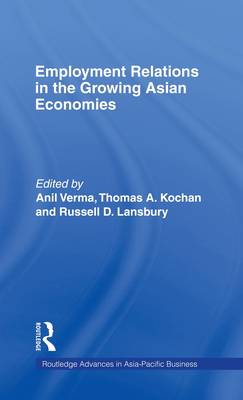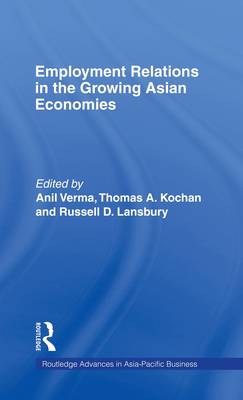
- Afhalen na 1 uur in een winkel met voorraad
- Gratis thuislevering in België vanaf € 30
- Ruim aanbod met 7 miljoen producten
- Afhalen na 1 uur in een winkel met voorraad
- Gratis thuislevering in België vanaf € 30
- Ruim aanbod met 7 miljoen producten
Zoeken
Employment Relations in the Growing Asian Economies
€ 290,45
+ 580 punten
Omschrijving
This book analyses the role of employment relations in the context of economic development in some of the key Asian economies: China, Hong Kong, India, Malaysia, the Phillipines, Singapore, South Korea and Taiwan. In recent years, these Asian economies have become increasingly more open and export-driven, and there is strong interest all over the world in the Asian economic `miracle' among practitioners and scholars alike. Although much has been written on this region, few books have concentrated on the human resource aspects of this growth. The authors build on the basic premise that the initial success of these countries has lain in low wages and suppression of workers' rights. However, they point out that as employment relations evolve enterprises will either pull out due to rising wages, or stay and prosper by adapting to higher wages. Cases are provided to illustrate both of these features. The evidence in the book suggests that unless a synergy is created between firm-level and state-level human resource policies in areas such as skill formation and workers' need for voice, economic growth is unlikely to be sustainable.
Specificaties
Betrokkenen
- Uitgeverij:
Inhoud
- Aantal bladzijden:
- 382
- Taal:
- Engels
- Reeks:
- Reeksnummer:
- nr. 1
Eigenschappen
- Productcode (EAN):
- 9780415125840
- Verschijningsdatum:
- 14/09/1995
- Uitvoering:
- Hardcover
- Formaat:
- Genaaid
- Afmetingen:
- 145 mm x 217 mm
- Gewicht:
- 517 g

Alleen bij Standaard Boekhandel
+ 580 punten op je klantenkaart van Standaard Boekhandel
Beoordelingen
We publiceren alleen reviews die voldoen aan de voorwaarden voor reviews. Bekijk onze voorwaarden voor reviews.










